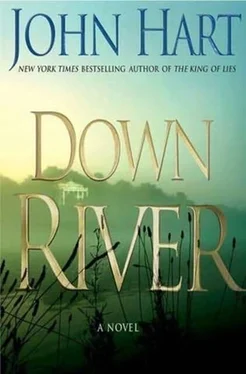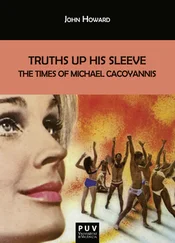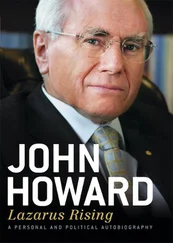“I hear the things you say,” she said. “You and Dolf, talking at night. You never notice me. You wouldn’t see me if I sat down next to you. Oh. But not Grace. Perfect, darling Grace! It’s like a light comes off her… That’s what you like to say, isn’t it? She’s so pure. So different from everybody else. Different from me.” She beat the gun against her head again. “Better than me.” Her voice dropped, and when she looked up, she could have shared a bloodline with any of those wild dogs. “I know your secret,” she said.
“Miriam-”
“Your filthy, disgusting secret!”
My father stepped closer. The rifle did not waver.
“You ruined me,” she said. Then she screamed again. “Look how you ruined me!” She tore at the front of her dress, buttons flying until she ripped it open. She held the pieces spread, showing us her pale body.
Her pale, cut body.
Every inch. Every curve. The scars shone like all the hurt the world had ever known. Her stomach. Her thighs. Her arms. Every place that clothing could cover had been cut and cut again.
The word pain carved over her heart; deny cut into her stomach.
I heard my father, like he was choking. “Dear God,” he said, and looking at her, I knew that the cutting was not something she’d done for five years. Not since the death of Gray Wilson. No chance. This had gone on for a long, long time.
Miriam looked at me, and her face was an open wound. “She’s his daughter,” she said.
“Stop, Miriam.”
But she would not. Pain twisted her face. Loss. Anguish. She looked at Grace, and I saw jealousy and hatred. Dark emotions. So very dark.
“All these years.” Her voice broke. “He always loved her more.”
The pistol started up.
“Don’t,” my father said.
The pistol wavered. Miriam looked from Grace to my father, and her face crumpled. Tears. Rage. Those same sparks of crazy light. The barrel moved, tracked across the floor toward Grace.
My father spoke, and desolation was in his voice. “For God’s sake, Miriam. Don’t make me choose.”
She ignored him, turned to me. “Do the math,” she said. “He ruined you, too.”
Then she brought the gun up, and my father pulled the trigger. The barrel leapt, shot out fire and noise enough to end the world. The bullet struck Miriam high on the right side of her chest. It spun her twice, like a dancer, and flung her across the room. She went down, boneless, and I knew, at a glance, that there would be no getting up.
Not now.
Not ever.
Smoke hung in the room. Grace cried out.
And my father wept for the fourth time in his life.
Grace was still alive when the paramedics arrived. Alive, but barely. They worked on her as if she could die any second. At some point, she winked out. The eyes rolled white, red fingers opened. I didn’t know that I was banging the back of my head against the wall until Robin put a hand on me. Her eyes were calm and very brown. I looked at Grace. One of her legs twitched, fine shoe clicking on the wood floor as they forced air down her throat and beat unmercifully on her chest. I barely heard the sound of her breath when they got her back, but somebody said, “She’s good,” and they bundled her out of there.
I met my father’s eyes across the floor. He sat against one wall. I was propped against the other. As badly as I hurt, and as near as Grace was to death, my father, I think, suffered the most. I watched him as a paramedic bent over my leg. He’d checked Miriam’s body once, then held onto Grace as if he was strong enough to hold her soul in place. The paramedics had to pull him away to work on her. He was soaked with her blood, in plain, open anguish, and I knew that part of it came from what he’d done, and part of it was born from the truth of what Miriam had said with her last breath. He knew what it meant, and I did, too.
Grace was his daughter. Fine. Fair. Happens all the time. Looking back, it made sense. His love for her had never been an understated thing. But she didn’t come to the farm until two years after my mother’s death. I’d never done the math. It had never occurred to me. But I knew Grace’s birthday, and I saw it now, Miriam’s gift.
Truth in a dark box.
Grace was born two days before my mother killed herself, and that could not be coincidence.
Miriam was right.
He’d ruined me, too.
My father lifted his arm and opened his mouth as if he might speak, but I couldn’t have that. I put a hand on the paramedic’s shoulder. “Can you get me out of here?” I asked.
I glanced once more at my father, and when he saw my face, he closed his mouth.
I woke in hospital sheets: dim lights, drugged, no memory of the surgery they’d done on my leg. But I remembered the dream of young Sarah Yates. It was the same one that I’d had several nights before. Almost the same. She walked in the moonlit yard, dress loose around her legs. When she turned, she raised her hand as if a penny lay flat upon it. In the past, that’s where the dream ended. Not this time. This time I saw it all.
The hand rose up and she touched her fingers to her lips. She smiled and blew a kiss, but not to me.
The dream was no dream. It was memory. Standing at my window, a boy, I saw it all. The windblown kiss, the secret smile; and then my father, shoeless in the pale, damp grass. How he scooped her up and kissed her for real. The raw, naked passion that I recognized even then.
I’d seen it, and I’d buried it, tucked it away in some small place in that boy’s mind. But I remembered it now, felt it like a tear in my soul. Sarah Yates was not familiar to me because she looked like Grace.
I knew her.
I thought of what the preacher had said to me about the nature of my mother’s death. “There’s no one to blame,” he’d said, and in the shadow of the church I’d always known, those words made some kind of sense. But not now.
I’d been angry for twenty years, unsettled, restless. It was like I had a shard of glass in my mind, a red blade that twisted through the soft parts of me, traveled the dark roads, cutting. I’d always blamed my mother, but now I understood. She’d pulled the trigger, yes, done it in front of me, her only child. But what I’d said to my father was true. She’d wanted him to see it, and now I understood why. Eight years of miscarriages. Constant failure until it wore her down to nothing.
Then, somehow, she knew.
And pulled the trigger.
The anger, I finally realized, was not at my mother, whose soul had simply withered beyond her capacity to restore. Being angry at her was unfair, and in that, I’d failed her. She deserved better. Deserved more. I wanted to weep for her, but could not.
There was no place in me for gentle emotion.
I pressed the call button for the nurse, a large woman with brown skin and indifferent eyes. “People are going to want to talk to me,” I said. “I don’t want to speak to anyone until nine thirty. Can you make that happen?”
She leaned back, a twist of smile on her face. “Why nine thirty?”
“I need to make some calls.”
She turned for the door. “I’ll see what I can do.”
“Nurse,” I said. “If Detective Alexander comes, I’ll speak with her.”
I looked at the clock. Five forty-eight. I called Robin at home. She was awake. “Did you mean what you said about choice?”
“I think I was pretty plain.”
“Words are easy, Robin; life is hard. I need to know if you really mean it? All of it. The good and the bad. The consequences.”
“This is the last time I’m going to say it, Adam, so don’t ask me again. I made my choice. You’re the one holding back. If you want to talk about choice, then we need to talk about you. It can’t be a one-way street. What’s the point?”
Читать дальше












